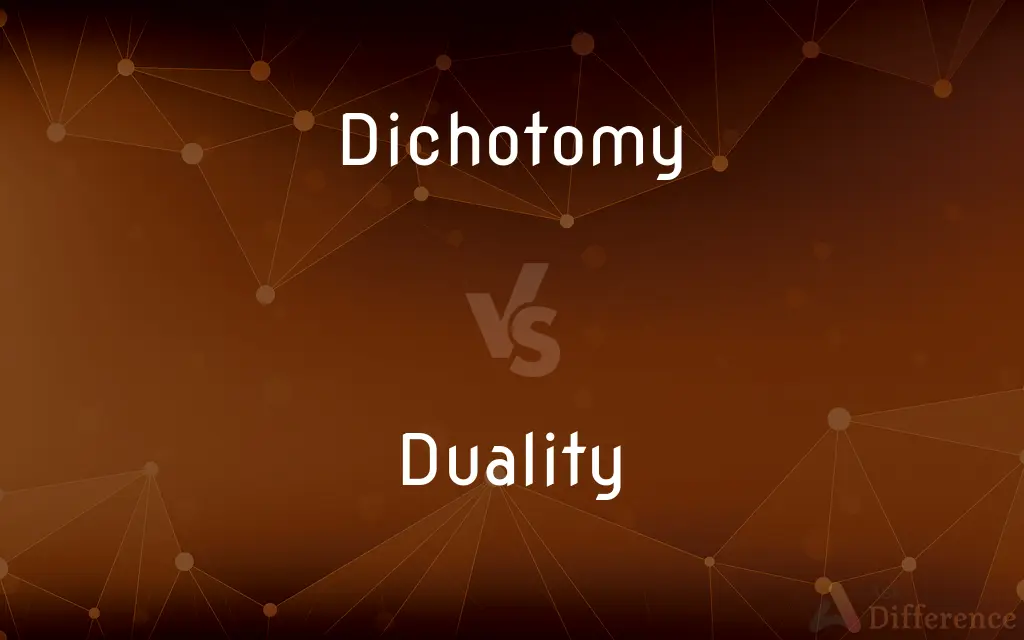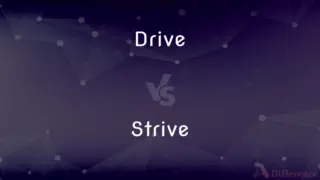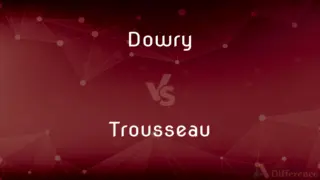Dichotomy vs. Duality — What's the Difference?
By Maham Liaqat & Urooj Arif — Updated on April 4, 2024
A dichotomy represents a division between two completely opposite things, while duality refers to two aspects or concepts that exist simultaneously within a single entity.

Difference Between Dichotomy and Duality
Table of Contents
ADVERTISEMENT
Key Differences
Dichotomy involves splitting a whole into two parts that are mutually exclusive and often contradictory, emphasizing a clear separation. For instance, the dichotomy between good and evil posits that the two are fundamentally opposite. On the other hand, duality acknowledges the coexistence of two characteristics or identities within the same unit, such as the duality of light being both a wave and a particle, suggesting a complexity and interrelation rather than a straightforward opposition.
The concept of dichotomy is often used in discussions and analyses that require distinct categorization, helping to simplify complex subjects by dividing them into two opposing groups for easier understanding. Duality, however, is embraced in contexts that explore the nuanced and multifaceted nature of something, acknowledging that it can embody two (often seemingly contradictory) aspects at once.
In philosophical or theoretical discourse, dichotomies are criticized for oversimplifying the spectrum of possibilities into black-and-white categories, ignoring the nuances and intermediate states that exist. Duality, in contrast, is often used to highlight the inherent contradictions within a subject or system, suggesting a more integrated and holistic approach to understanding its nature.
Dichotomy is a powerful tool for analytical clarity and decision-making, providing a clear-cut distinction that aids in choosing between two alternatives. Duality, however, enriches the understanding of a concept or phenomenon by emphasizing its inherent complexities and the interplay between its contrasting aspects.
While dichotomy and duality can both be used to describe the relationship between two elements, the former tends to focus on separation and opposition, whereas the latter on unity and coexistence. This fundamental difference shapes how each concept is applied across various disciplines, from philosophy to physics, and influences the way we interpret and engage with the world.
ADVERTISEMENT
Comparison Chart
Definition
A division into two mutually exclusive, opposed, or contradictory groups
The quality or condition of having two parts or aspects
Nature
Oppositional and exclusive
Complementary and interconnected
Usage
To categorize and clarify by separating into two distinct groups
To acknowledge complexity and coexistence within the same entity
Examples
Good vs. evil, nature vs. nurture
Light as both wave and particle, the duality of human nature
Implications
Simplifies complex concepts but can overlook nuances
Recognizes and explores complexity and contradiction
Compare with Definitions
Dichotomy
A tool for analytical clarity and categorization in academic disciplines.
Economic analyses frequently employ a public vs. private dichotomy.
Duality
The state of combining two different elements in a single entity.
The duality of light reflects its ability to exhibit both wave-like and particle-like properties.
Dichotomy
Used in logic and philosophy to describe mutually exclusive opposites.
The classic dichotomy of form and content in art critique.
Duality
Often found in philosophical, spiritual, and psychological contexts.
Many Eastern philosophies embrace the duality of existence, such as yin and yang.
Dichotomy
A division between two things that are represented as being entirely different.
The dichotomy between science and religion often overlooks areas of agreement.
Duality
Can indicate a complex or contradictory relationship rather than a division.
The novel explores the duality of love and hate in human relationships.
Dichotomy
Can imply a clear and distinct separation with no middle ground.
The political dichotomy of left versus right simplifies a complex spectrum of beliefs.
Duality
Highlights the interplay and balance between contrasting forces.
The character's journey illustrates the duality of strength and vulnerability.
Dichotomy
Sometimes criticized for oversimplifying nuanced issues.
The nature vs. nurture dichotomy ignores the interaction between genetics and environment.
Duality
A concept that recognizes the existence of two characteristics or states at once.
The duality of human nature explores the capacity for both altruism and selfishness.
Dichotomy
A dichotomy is a partition of a whole (or a set) into two parts (subsets). In other words, this couple of parts must be jointly exhaustive: everything must belong to one part or the other, and mutually exclusive: nothing can belong simultaneously to both parts.Such a partition is also frequently called a bipartition.
Duality
The quality or character of being twofold; dichotomy.
Dichotomy
A division or contrast between two things that are or are represented as being opposed or entirely different
A rigid dichotomy between science and mysticism
Duality
A classification into two subclasses or opposed parts.
Dichotomy
Repeated branching into two equal parts.
Duality
(projective geometry) The interchangeability of points and planes.
Dichotomy
A division into two contrasting parts or categories
The dichotomy between rural and urban communities.
Regards the division between nature and nurture as a false dichotomy.
Duality
The mathematical equivalence of two seemingly different theoretical descriptions of a physical system.
Dichotomy
(Astronomy) The phase of the moon, Mercury, or Venus when half of the disk is illuminated.
Duality
The quality or condition of being two or twofold; dual character or usage.
Dichotomy
(Botany) Branching characterized by successive forking into two approximately equal divisions.
Duality
Being twofold; a classification into two opposed parts or subclasses;
The dichotomy between eastern and western culture
Dichotomy
A separation or division into two; a distinction that results in such a division.
Duality
(physics) the property of matter and electromagnetic radiation that is characterized by the fact that some properties can be explained best by wave theory and others by particle theory
Dichotomy
Such a division involving apparently incompatible or opposite principles; a duality.
Duality
(geometry) the interchangeability of the roles of points and planes in the theorems of projective geometry
Dichotomy
(logic) The division of a class into two disjoint subclasses that are together comprehensive, as the division of man into white and not white.
Dichotomy
The division of a genus into two species; a division into two subordinate parts.
Dichotomy
(astronomy) A phase of the moon when it appears half lit and half dark, as at the quadratures.
Dichotomy
(botany) Division and subdivision; bifurcation, as of a stem of a plant or a vein of the body into two parts as it proceeds from its origin; often successive.
Dichotomy
A cutting in two; a division.
A general breach or dichotomy with their church.
Dichotomy
Division or distribution of genera into two species; division into two subordinate parts.
Dichotomy
That phase of the moon in which it appears bisected, or shows only half its disk, as at the quadratures.
Dichotomy
Successive division and subdivision, as of a stem of a plant or a vein of the body, into two parts as it proceeds from its origin; successive bifurcation.
Dichotomy
The place where a stem or vein is forked.
Dichotomy
Division into two; especially, the division of a class into two subclasses opposed to each other by contradiction, as the division of the term man into white and not white.
Dichotomy
Being twofold; a classification into two opposed parts or subclasses;
The dichotomy between eastern and western culture
Common Curiosities
How does recognizing duality affect our understanding of a subject?
Recognizing duality allows for a more nuanced and comprehensive understanding that acknowledges complexity and contradictions within a subject.
Why might dichotomies be criticized?
Dichotomies may be criticized for oversimplifying complex subjects by forcing them into two opposing categories, potentially ignoring the spectrum that exists between them.
Can a concept have both dichotomy and duality?
Yes, a concept can be understood through both lenses in different contexts, reflecting either its oppositional aspects (dichotomy) or its interconnected ones (duality).
Is duality always about balance?
While duality often involves balance, it's more fundamentally about the presence of two aspects within the same entity, which may not always be in balance.
How do dichotomy and duality apply in everyday life?
In everyday life, these concepts help us navigate and make sense of the world by categorizing experiences (dichotomy) and recognizing the complexity in situations and people (duality).
How can understanding these concepts improve critical thinking?
Understanding dichotomy and duality enhances critical thinking by encouraging the examination of subjects from multiple perspectives, fostering a deeper and more nuanced analysis.
Can cultural perspectives influence the preference for dichotomy or duality?
Yes, cultural backgrounds and philosophical traditions can influence whether one leans towards viewing the world in terms of dichotomies or dualities.
Is one concept more accurate or valuable than the other?
Neither concept is universally more accurate or valuable; each serves different purposes and offers unique insights depending on the context and the nature of the subject being considered.
What is the key difference between dichotomy and duality?
The key difference lies in the nature of the relationship: dichotomy is about opposition and separation, while duality is about coexistence and interrelation.
How do dichotomy and duality function in scientific discussions?
In science, dichotomy can aid in classification and hypothesis testing, while duality can help explain phenomena that exhibit dual characteristics, such as light in physics.
Share Your Discovery

Previous Comparison
Drive vs. Strive
Next Comparison
Dowry vs. TrousseauAuthor Spotlight
Written by
Maham LiaqatCo-written by
Urooj ArifUrooj is a skilled content writer at Ask Difference, known for her exceptional ability to simplify complex topics into engaging and informative content. With a passion for research and a flair for clear, concise writing, she consistently delivers articles that resonate with our diverse audience.














































